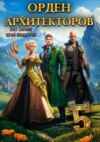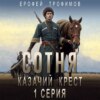Читать книгу: «Sweet Mace: A Sussex Legend of the Iron Times», страница 12
He stopped swimming away from him then, and taking a few strokes back, with his boots seeming to be made of lead, he tried to make out where Wat was swimming, and only found him by the bubbling water which was just closing over his head.
It required almost superhuman energy as, with a vigorous snatch, Gil caught his follower by the beard and drew his face above water, holding him so while he drew breath.
“No use – save yourself!” panted Wat. “I’m spent, skipper – spent.”
“Do as I bid you,” cried Gil, angrily. “Turn over – your back – float – that’s well. Now mind: leave me free. If you clutch my arms we shall both go down.”
As he spoke he tried hard to kick off his heavy boots, but they clung to his legs, and to have continued striving meant to sink. Throwing himself upon his back then, and with one hand grasping Wat Kilby’s hair, he once more struck out, gazing of necessity upwards at the starless sky, and feeling more and more that unless some miracle interposed in their favour they must both lose their lives. It was impossible to tell in what direction he was going when his every energy was directed to trying to keep them both afloat; and, strive to contain himself how he would, there was always the knowledge upon him that, moment by moment, he was growing weaker.
For the water came more and more over his lips, thundered more heavily in his ears, and kept, as it were, forcing itself up his nostrils, burning, and strangling him, and causing such an intense desire to struggle with all his might for life, that, but for the disciplining of years and the power it had given him of mastering his own emotions, there would have been a minute’s desperate struggling, a few agonised cries for help, and then the water would have closed over his head.
The water that had risen at each stroke to his chin was now always above his lips, then above his nostrils, and it was only by frantic efforts that he recovered himself for a few moments; but directly after his heavy boots dragged him lower and lower, and with a gasping cry he gave one more tremendous stroke, when he felt his head forced in amongst a clump of reeds, and for the moment he could breathe.
He lay with the back of his head in amongst the reeds for some minutes, not daring to move lest he should glide back into deep water, but even now the waves were rippling end playing in his ears. He could not stay long, however, like that, for he had Wat Kilby to think of; and throwing one arm back over the reeds he dragged himself more amongst them, and at the same time pulled Wat close to his side.
How it was done he never afterwards knew, only that he contrived somehow to rouse the old sailor sufficiently to once more take a little interest in life, and draw himself over and amongst the reeds.
So far from being in safety, all they had gained was the power to breathe, for at the least movement the thin, whispering, water-grasses gave way, and their position was worse.
“Can you hear me speak, Wat?” said Gil at last, in a hoarse voice, as he felt that he was once more gaining breath.
“Ay, skipper,” said the old fellow, faintly; “I be not dead yet.”
“Can you draw yourself more amongst the reeds?”
There was a few minutes’ pause, and then Wat said with a groan, “No, skipper. If I move, it means going below; there’s nothing to hold on by.”
Gil foresaw that this would be the reply, for on feeling cautiously round he could only come to the conclusion that they were half floating, half lying, among some nearly-submerged reeds, and that the slightest effort to better their condition meant the destruction of the frail support.
“Wait till you get your breath, Wat, and then shout for help,” said Gil.
“Nay, I’ll not call,” was the hoarse reply. “Do thou shout, skipper.”
“I order you to call, Wat,” was the half-angry reply; and, in obedience, Wat uttered a hoarse hail from time to time, for his voice to go floating over the water, borne by the breeze away from the Pool-house, and here the two men lay some three hundred yards from the garden, cold, benumbed, and gradually growing more helpless, while those who were nearest slept on hearing no cries, and in utter ignorance of the peril in which the two well-known adventurers lay.
The hails uttered from time to time reached one or two of the cottages, but those who heard the sounds float from off the lake merely turned once in their beds, and thought of marsh spirits, or the night-walkers that had been seen from time to time, passing along the tracks; while the less superstitious said to one another, “Captain Culverin and his men be out to-night. What be in the wind now?”
Again and again did Gil make an effort to find where they lay, and see if he could not reach the boat, and come back to his companion’s help; but the darkness was made more intense by the thick mist which was heavier than ever. He was rested though, and had the nerve to make a bold effort, but those boots that clung to his legs far above his knees were like lead, and he dare hardly stir.
Try how he would, he was fain to conic to the conclusion that he must lie passive amongst those reeds, saying a few words to Wat Kilby from time to time, to encourage him; for the old man, sturdy as he was, seemed to have taken quite a fatalist view of their case.
“Wait for daylight, skipper?” he said, sadly. “No; I think it be morning that will have to wait for me, and I shan’t answer to my number. The cold water be getting into my joints, and I be too stiff to move.”
To remain for long in their cramped and helpless situation seemed to Gil at first impossible; but hour after hour glided away, and save the rippling of the water hardly a sound greeted the sufferers’ ears. Too numbed and helpless even to cry out for help, they lay waiting for morning, hardly hoping to see the dawn, for at any moment a slip would have sent them into deep water, to go down at once.
Sometimes a soft wind stirred the thick steamy mist upon the water and rustled the reeds above their heads; while, at intervals through the night, the cry of some coot or duck floated weirdly across the great Pool, but, at last, all those things seemed to Gil to be part of a confused dream, as he grew, more and more numbed and helpless. The water washed higher over his face, but he could not raise his head to avoid it, nor disturb the current of his thoughts, which were flowing placidly enough now, and quite unmingled with despair, along his life-course; and it seemed ridiculous to him that he, who had braved so many perils of the mighty sea, should perish on this pitiful pond. Then he began to think of Mace and her feelings when she heard of his death; and, with a sigh, he thought it seemed hard indeed that he should die now when he was so sure of her love. But he whispered a blessing upon her to the soft summer breeze, and thanked Heaven that they had parted so happily that night.
Wat Kilby had not spoken for hours, but lay there in a state of torpor, till suddenly he exclaimed: —
“You there, skipper?”
“Yes, Wat.”
“I wouldn’t care so much only – ”
There was a pause here.
“Only that I have got my bag of tobacco here in my pocket, and it be quite wet through.”
After that, there was utter silence.
How two went a-fishing, and what they caught
“You may argue, Brother Brisdone, till all is blue,” said Master Peasegood, “but I maintain that what I say is right. Now, look here; go back to the early days, and take your own apostle.”
“My own apostle?” said Father Brisdone, smiling, as they walked down the lane, soon after sunrise, one bearing a basket the other a bag. The heavy dew lay upon leaf and strand, and sparkled in the brilliant sunshine; birds sang and flitted from bough to bough, scattering the heavy drops from off each spray; and, as the two clerics had come out of the cottage after an early breakfast, they had stood breathing the soft pure air, and smiled back at smiling Nature.
“My own apostle?” said Father Brisdone.
“Yes, Saint Peter; the rock upon which your church is built. Well, what was he – a fisherman?”
“Yes,” said Father Brisdone, “before he took up his holy calling.”
“Fisherman still, good brother. Did he not become a fisher of men? Depend upon it, brother, Peter, if he had been down by the lake again, would have enjoyed a good pull at the net.”
“Maybe, maybe,” said the father, smiling.
“Well, let’s grant it. Now, I was a fisherman before I took to the cloth, and I have been a fisherman ever since, right or wrong; and I hold that there is very little wrong in providing a dinner.”
“I’ll not argue with you,” said Father Brisdone. “If all men were like you, Brother Peasegood, this would be a happier world.”
“Wrong again!” cried Master Peasegood. “You see you force on an argument. If all men were like me, brother, it would be an unhappier world; for, look you, I’m too fat. I’m as big as three small men; and, if all were like me, we should be so crowding and elbowing each other that we should be quarrelling for want of room. Ha, ha, ha!” and “ha, ha, ha,” he laughed again, making the rocks and woodlands echo to his jovial mirth; the stray rabbits betrayed their whereabouts by showing their little white tails as they hopped into their holes; and snake and lizard upon sunny bank hurrying away to safety long before the footsteps could be heard.
“There’s something in fishing that seems to expand the heart,” continued Master Peasegood to his willing hearer. “I never knew a man who was a good fisherman who was very wicked or brutal.”
“In other matters,” said Father Brisdone, with a smile.
“Well, well, well, but the fish we catch are vile, cruel things, which persecute their smaller fellows. Why, I’ve known a luce of twenty pounds seize and half swallow one of ten, and kill himself in the act. Oh, no, brother, I have no pity for a great luce or pike; and, besides, see what they are when nicely treated, well cleaned, and stuffed, and buttered, and baked. Ha, ha, ha! we have the advantage of you there, Brother Brisdone; we can be carnal-minded, and eat, and drink, and wive if we like. But come along and let’s begin. I can sniff the water now, with its soft wreaths of mist floating around. We’ll have the boat and set our lures, and fish for a couple of hours, and then take a brace of the finest to Master Cobbe, and beg some more breakfast for our pains.”
“But suppose we catch no fish?”
“But we shall catch fish – more, perhaps, than you expect.”
The two friends trudged on, and, upon turning a corner of the narrow lane, came upon Mother Goodhugh, standing at the turning where Sir Mark had made his first acquaintance with Wat Kilby.
“Good morrow, Mother Goodhugh,” said the stout parson.
“Save thee, my daughter,” said Father Brisdone.
“Are you both going to curse the murderer of Abel Churr?” said Mother Goodhugh, sourly.
“Nay,” said Master Peasegood; “and it would behove thee better, good woman, if thou did’st not sprinkle these curses of thine about with so liberal a hand. Come along, father.”
“Yes, go along,” cried the old woman, maliciously; “time-servers and makers of friendship with the ungodly as you are. But you’ll see, you’ll live to see.”
“She’s a terrible old woman,” said Master Peasegood, with a curious smile upon his lip; “and she seems to make my fat go cold, like unto that of venison on an unwarmed dish. I’ve given her up, father, as a bad nut to crack. The worst of it is, that if I turn prophet my sayings are never fulfilled; while, when she raises her voice, her prophesyings come to pass, and the simple folks here believe in her more than in me. But thank goodness, here we are.”
Three hundred paces brought them to the edge of the lake, over which the soft white mists were disappearing before the sun. The boat lay on the sandy beach, with a chain holding it fast to the trunk of an old willow; and, as soon as the basket and wallet had been laid in, Master Peasegood helped his friend to take his place.
“I don’t think I shall swamp the boat, Brother Brisdone,” he said, laughing, as he sent the skiff well down in the water. “If I do, just you hold on tightly to my gown, for I’m too fat to sink.”
A hearty “Ha, ha, ha!” floated across the lake as he finished his speech; and then, taking the little oars, he proceeded to paddle across for some distance before pausing and opening the large basket he had brought.
The first thing taken out was a large can of water with a lid pierced with holes; and then from the bag were shaken out a dozen bladders, each tied round the centre with a string and a loop. From his basket Master Peasegood then brought out a dozen goodly hooks, whose points were stuck in a piece of cork, and whose strings were neatly tied in a bunch; and, as he took them off, one by one, each was baited with a fresh young gudgeon from the can, the string attached to one of the bladders, and this dropped overboard to float away.
In a short time the whole of the hooks were baited, and the lake dotted with the bladders that floated here and there, borne by the breeze or tugged by the lively gudgeons. Then, and then only, did Master Peasegood nearly upset the boat by leaning over the side to wash his hands, and smile at his companion.
His smile was not perceived though, for Father Brisdone was sitting with one elbow upon his knee, his cheek upon his hand, gazing out and away at the soft landscape, with the Pool-house and its works glorified by the morning sun.
“Now we’ll sit and talk for awhile,” said Master Peasegood, smiling jollily. “What do you say to a pleasant subject for discussion – say purgatory?”
“Because thou hast been putting these poor gudgeons into a state of misery, brother?” said Father Brisdone.
“Let the gudgeons rest,” said Master Peasegood. “They have all gone overboard like so many finny Jonahs, for the benefit of those on board this ship; and, if they are lucky, they will soon be safe in so many whales’ insides. Ha, ha, ha! Master Brisdone, I’m afraid I’m a very irreverent disciple. By all the saints, there goes one of the Jonahs. See!”
He pointed to where, just by a reed-bed towards which the bladder had drifted, there was a tremendous swirl in the water, and away it went skimming along at a rapid rate.
“Ha, yes, I suppose that will be a great fish,” said Father Brisdone, sadly; “but I was thinking of the maiden at yon house – sweet little Mace.”
“Bless her!” said Master Peasegood.
“Amen,” said his companion. “Brother Joseph, she is at a perilous age, and I do not think her father’s to be trusted.”
“You mean with her future?” said Master Peasegood. “I fear so too. Poor child, she needs a mother’s counsel!”
“Think you she has a lover?” said Father Brisdone, quietly.
“Two fierce luces playing round the little gudgeon,” cried Master Peasegood, excitedly. “One of them will snatch it up directly. Nay, nay,” he continued, reddening; “I meant no inference. I was thinking of yon bait. There it goes.”
He pointed to where a gudgeon had leaped several times out of the water to escape a couple of fierce pike, one of which seized it and bore it off.
“Lovers?” he continued. “Yes, that courtly fellow from town is trying to win her, and so is Gilbert Carr.”
“And she?”
“She loves Culverin Carr with all her pretty little soul, but he shall not have her unless – ”
“Unless what?”
“He mends his ways. She shall marry no scapegrace who plays fast and loose with women’s hearts. He trifles with Mistress Anne Beckley, and the silly girl is mad for him.”
“Nay, I think you wrong him, brother. I believe in Gil Carr as a true gentleman at heart. I love the brave, bold youth.”
“I hope I do wrong him,” said Master Peasegood. “He’s a fine, handsome fellow, but I will not have my little white moth played with, and the tender down upon her winglets crushed by unholy hands.”
“Why do you call her white moth?” said the father, dreamily.
“It is a fancy of the people here, because she dresses in white; and they meet her, looking soft, and white, and ethereal, in the woody lanes at eventide where moths abound. Ah, Father Brisdone, happy men are we who early marry ourselves to the Church, and know nought of these fleshly troubles. Yes, they call her the white moth; and between ourselves it’s a glowworm that often comes wooing to her, and I fear his light will burn.”
Father Brisdone sighed. “Ha, ha, ha! that’s because another Jonah has gone down,” said Master Peasegood, pointing to a flying bladder.
“Nay,” said the other sadly; “I sighed at your words about our being happier without these fleshly cares. I don’t know – I don’t know.”
“More do I,” said Master Peasegood; “only that I’m very fatherly fond of little Mace, and if I can stand between her and Carr I will. Now, brother, we’ll chase that first great fish. Suppose you take the oars.”
Father Brisdone obeyed, and Master Peasegood fitted a large hook to the end of a stout walking-staff, directing his friend the while as he urged the boat over the limpid water, making fish dart away here and there amongst the water-lilies and flags.
They approached pretty near the bladder, and then away it went, showing that the great pike was well hooked, and now commenced a chase for some ten minutes, the captive always evading the great hook just as Master Peasegood was on the point of securing the string.
The chase led them right away over the deepest part of the Pool, and amidst various little islands of reeds growing on soft masses of decayed vegetation; the boat, when urged forward, passing easily amongst and over them, so lightly were they rooted in the soft vegetable fibre below.
“Now then, a good pull, brother, and we shall have him,” whispered Master Peasegood. “He’s a monster, but he is tired now. Four good strokes and then hold up your oars, and let the skiff glide and I’ll – Good God! what’s that? – the other oar, man, pull!”
The skiff spun round and was urged towards a clump of reeds, among which, and half covered by the water, were two ghastly faces, which settled down, gliding from their precarious hold, as the wave made by the skiff reached them.
Another moment and they would have been beyond reach, but Master Peasegood thrust his arm to the shoulder into the water, as he leaned over the side, and grasped the doublet of one man, thrusting in his hook and seizing the other, and then drawing both up to the sides of the boat, as it rustled amongst the reeds, but bringing the edge down so low that the water began to pour in over the side.
“Quick, brother, quick!” shouted Master Peasegood. “Hang over the other side, or we are lost!”
With a promptitude that might not have been expected from him, Father Brisdone threw himself to the other side of the skiff, and raised the endangered edge so that the water ceased to pour over the gunwale, while Master Peasegood deftly leaned sideways and dragged the first body he had secured round the stern of the boat.
Father Brisdone saw what he intended, and, changing his position a little, just managed to catch the doublet, and the next minute the boat was well balanced, for one of the bodies was being held up on either side.
“Are – are they dead?” whispered Father Brisdone, in an awe-stricken voice. “Poor lad – poor lad.”
“Heaven only knows,” cried Master Peasegood, as he changed his position and said, “Give me hold of the poor boy – his collar – that’s well. I’ve got this one the same. There, their heads are well above the water now, and I can hold them thus. Now take the oars and row for life.”
“But can you hold them?” cried Father Brisdone, as he obeyed his companion, and gazed at him the while, seated with hands grasping the two men’s collars, one on either side.
“I hope so. Oh, yes! They can’t drag me out of the boat, but it would be madness to try and drag them in. Row hard: never mind me.”
Father Brisdone bent to his task with a will, and in a fashion that showed how he had more than once handled an oar, while Master Peasegood braced himself up, and held on to his burdens as they dragged behind.
“You see who they are?” he said, as the skiff gathered way, and the water rattled under her bows.
“Yes; one is the man of whom we talked.”
“And the other is old Wat Kilby. I’ll never believe he is drowned,” cried Master Peasegood. “He’s born for quite another fate. Pull steady and hard, man. If my arms are jerked out of the sockets I’ll forgive thee. Ohe – ahoy – hoi – oy,” he shouted to a couple of men on the shore, and as they stopped to gaze others began to collect, so that by the time the side was reached there was plenty of willing aid, and hands ready to bear the two men into the charcoal-shed, where, by Father Brisdone’s orders, blankets were fetched and stimulants, while, under his instructions, strong hands rubbed the icy limbs.
This was continued for a time, and then the founder made a proposal, which was put into effect.
“Four of you, one to the corner of each blanket,” he cried; “and run them down to the little furnace. We can lay them on the hot bricks there.”
“Yes, quickly,” cried Father Brisdone. “The very thing.”
It was done, and the genial heat and the friction liberally applied. At first no change took place, and the founder shook his head; while Sir Mark, as he gazed at the stern, handsome countenance of Culverin Carr, felt that a dangerous rival had been removed from his path.
“We were too late, brother, were we not?” said Master Peasegood, sadly.
“I’ll tell thee, anon,” was the reply, as, with cassock off and sleeves up, Father Brisdone was toiling away, with the perspiration streaming down his forehead.
One hour – two hours passed, and still there was no sign of life. Those who aided would have given up long before but for the father’s example, led by which they worked manfully, till, to the great joy of the operator, there was a faint quivering about his patients’ eyelids.
Encouraged by this, all worked the harder, to be rewarded by a sigh from Gil, and a low growl from Wat Kilby, who now rapidly recovered consciousness, and startled all present by exclaiming: —
“Who has taken my tobacco?” Gil recovered more slowly, but he was soon able to speak; and the first person upon whom his eyes fell was Sir Mark, who seemed half fascinated by his gaze.
A couple of hours later the two men were sufficiently revived to bear removal; and in a gruff way, as if the show of hospitality were forced upon him, Master Cobbe offered them the use of his house.
Gil’s heart gave a leap of joy at the invitation, while Sir Mark’s countenance grew black as night. It resumed, its former aspect, though, as he heard Gil refuse, and merely request permission to stay where they were for a time, after which he said they would go their way.
“I’d give something to know how those two came so near being drowned,” said the founder, as he walked over the little bridge with Sir Mark.
“I’d give something,” said Sir Mark to himself, “if that meddling priest had left the scoundrel to die in peace. How I hate him, to be sure.”
Meanwhile, Mace, who had been upon her knees in her little chamber, praying with all her soul for her lover’s life, had now changed her prayer to thanksgiving, and at last stood by the window, and exchanged a look with him, as she saw him walk slowly away, with Wat Kilby, whose pipe was lit, and who was smoking as if nothing whatever had been amiss.
As to how the accident had occurred, that was the secret of the two sufferers, the guests that evening of Master Peasegood, whose luces were not sought for till the next morning, by which time three-parts had managed to get away, or rid themselves of their steel, leaving the floating bladders alone for the parson’s crook.
























